Sustainable and Responsible Management in Tourism( Pass Criteria )
VerifiedAdded on 2023/06/12
|14
|3563
|80
AI Summary
This report analyses the development of Tourism in terms of sustainability. It covers the concepts, principles, theories and models of sustainable management in relation with different UK based hospitality organisations. It also covers the innovative ideas and skills in sustainable and responsible management in hospitality sector. Further, the report evaluates tourism development.
Contribute Materials
Your contribution can guide someone’s learning journey. Share your
documents today.
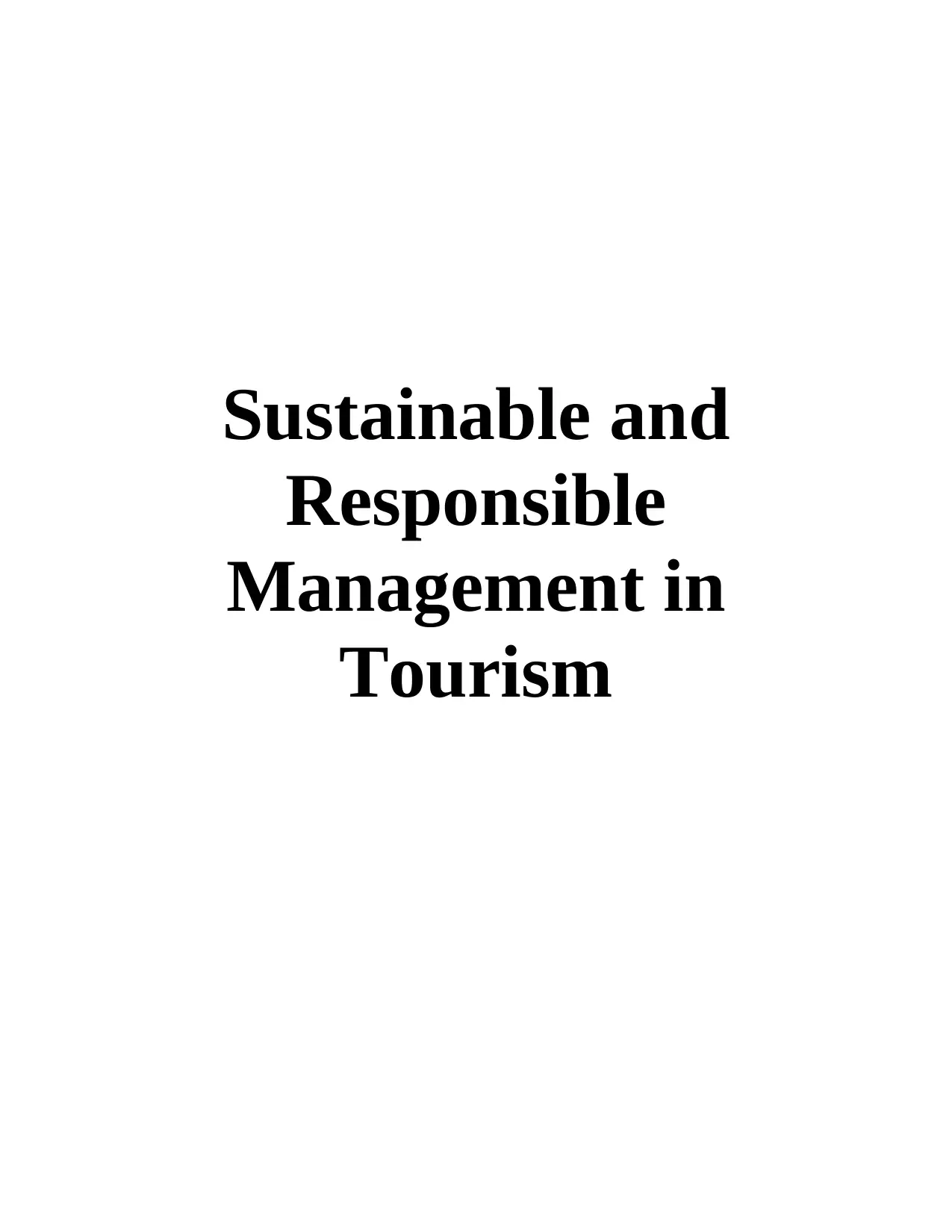
Sustainable and
Responsible
Management in
Tourism
Responsible
Management in
Tourism
Secure Best Marks with AI Grader
Need help grading? Try our AI Grader for instant feedback on your assignments.
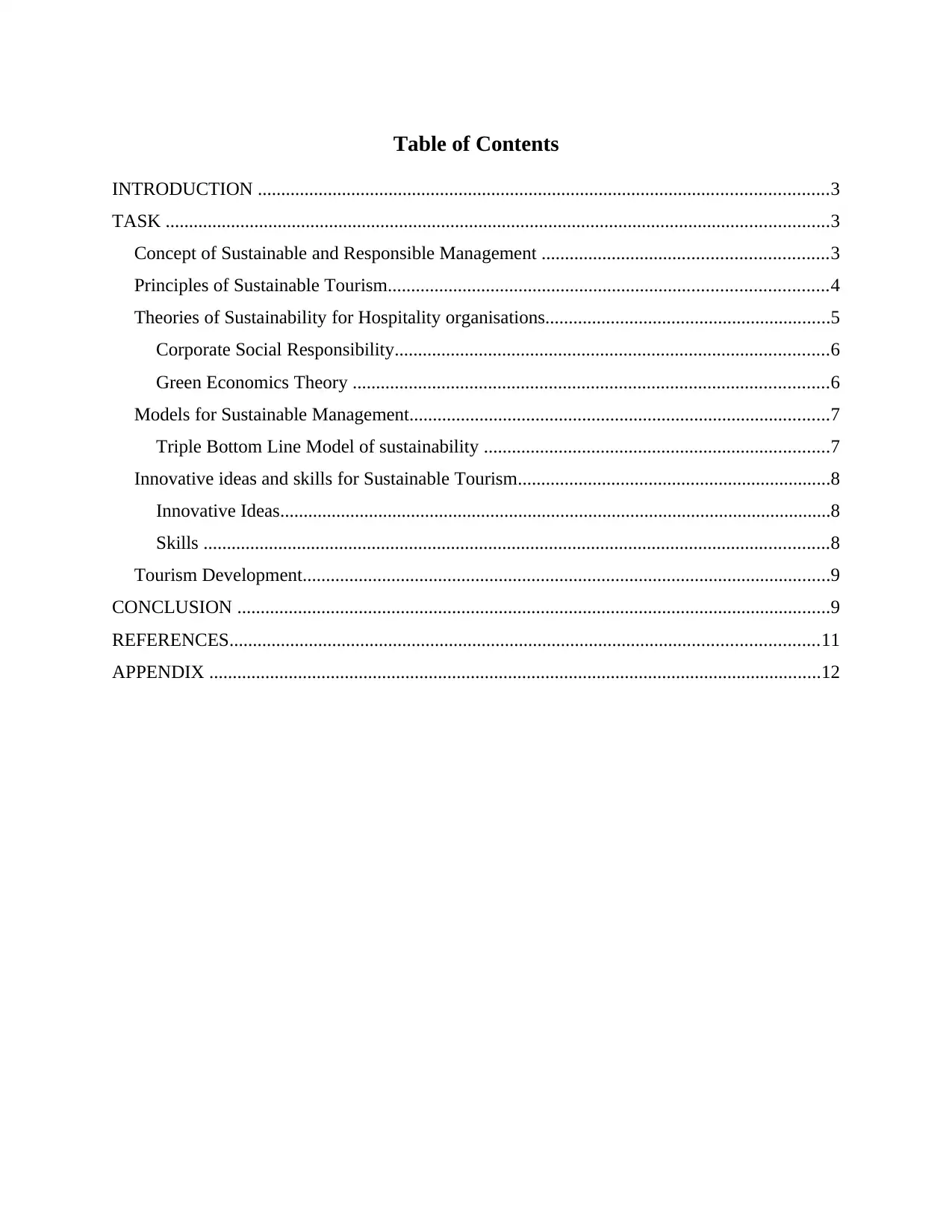
Table of Contents
INTRODUCTION ..........................................................................................................................3
TASK ..............................................................................................................................................3
Concept of Sustainable and Responsible Management .............................................................3
Principles of Sustainable Tourism..............................................................................................4
Theories of Sustainability for Hospitality organisations.............................................................5
Corporate Social Responsibility.............................................................................................6
Green Economics Theory ......................................................................................................6
Models for Sustainable Management..........................................................................................7
Triple Bottom Line Model of sustainability ..........................................................................7
Innovative ideas and skills for Sustainable Tourism...................................................................8
Innovative Ideas......................................................................................................................8
Skills ......................................................................................................................................8
Tourism Development.................................................................................................................9
CONCLUSION ...............................................................................................................................9
REFERENCES..............................................................................................................................11
APPENDIX ...................................................................................................................................12
INTRODUCTION ..........................................................................................................................3
TASK ..............................................................................................................................................3
Concept of Sustainable and Responsible Management .............................................................3
Principles of Sustainable Tourism..............................................................................................4
Theories of Sustainability for Hospitality organisations.............................................................5
Corporate Social Responsibility.............................................................................................6
Green Economics Theory ......................................................................................................6
Models for Sustainable Management..........................................................................................7
Triple Bottom Line Model of sustainability ..........................................................................7
Innovative ideas and skills for Sustainable Tourism...................................................................8
Innovative Ideas......................................................................................................................8
Skills ......................................................................................................................................8
Tourism Development.................................................................................................................9
CONCLUSION ...............................................................................................................................9
REFERENCES..............................................................................................................................11
APPENDIX ...................................................................................................................................12
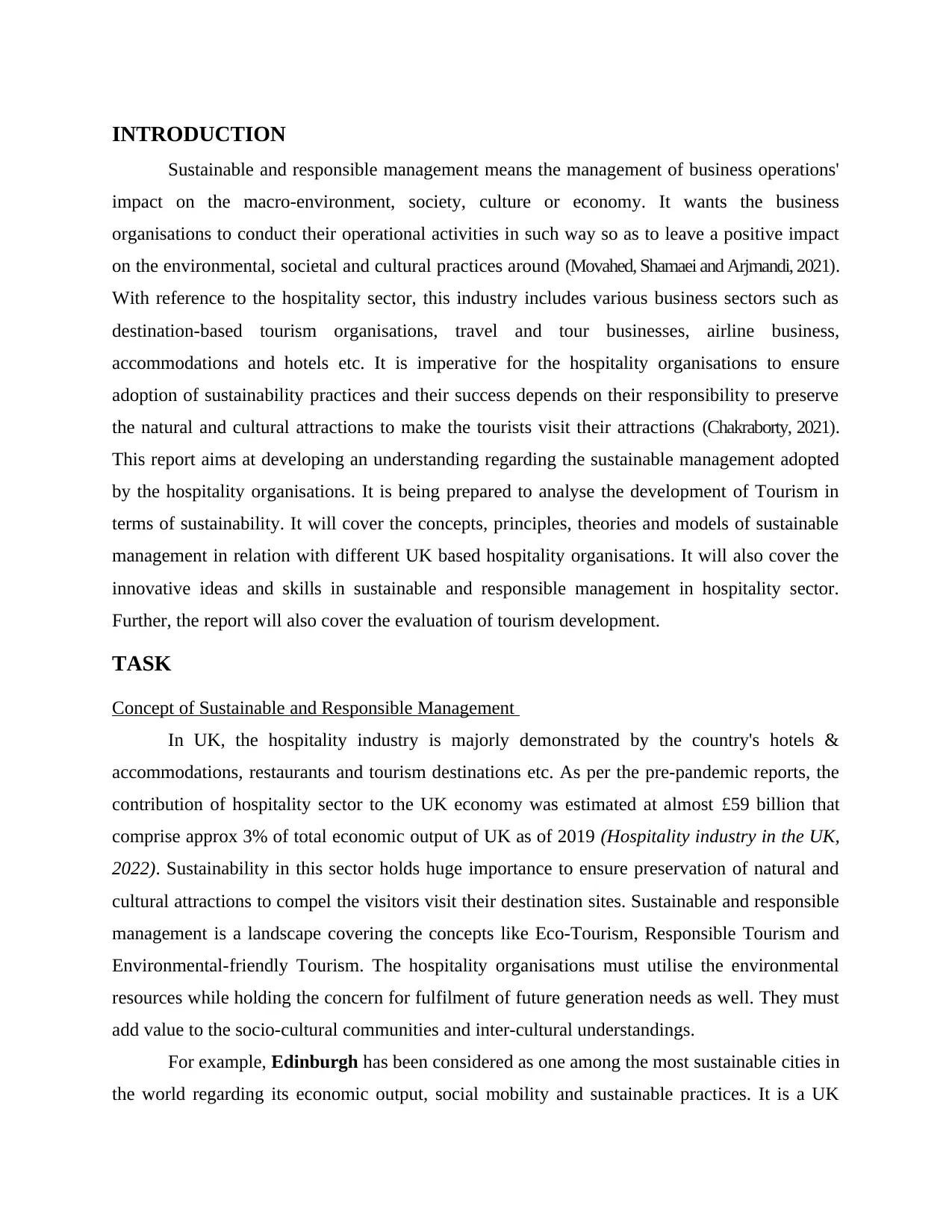
INTRODUCTION
Sustainable and responsible management means the management of business operations'
impact on the macro-environment, society, culture or economy. It wants the business
organisations to conduct their operational activities in such way so as to leave a positive impact
on the environmental, societal and cultural practices around (Movahed, Shamaei and Arjmandi, 2021).
With reference to the hospitality sector, this industry includes various business sectors such as
destination-based tourism organisations, travel and tour businesses, airline business,
accommodations and hotels etc. It is imperative for the hospitality organisations to ensure
adoption of sustainability practices and their success depends on their responsibility to preserve
the natural and cultural attractions to make the tourists visit their attractions (Chakraborty, 2021).
This report aims at developing an understanding regarding the sustainable management adopted
by the hospitality organisations. It is being prepared to analyse the development of Tourism in
terms of sustainability. It will cover the concepts, principles, theories and models of sustainable
management in relation with different UK based hospitality organisations. It will also cover the
innovative ideas and skills in sustainable and responsible management in hospitality sector.
Further, the report will also cover the evaluation of tourism development.
TASK
Concept of Sustainable and Responsible Management
In UK, the hospitality industry is majorly demonstrated by the country's hotels &
accommodations, restaurants and tourism destinations etc. As per the pre-pandemic reports, the
contribution of hospitality sector to the UK economy was estimated at almost £59 billion that
comprise approx 3% of total economic output of UK as of 2019 (Hospitality industry in the UK,
2022). Sustainability in this sector holds huge importance to ensure preservation of natural and
cultural attractions to compel the visitors visit their destination sites. Sustainable and responsible
management is a landscape covering the concepts like Eco-Tourism, Responsible Tourism and
Environmental-friendly Tourism. The hospitality organisations must utilise the environmental
resources while holding the concern for fulfilment of future generation needs as well. They must
add value to the socio-cultural communities and inter-cultural understandings.
For example, Edinburgh has been considered as one among the most sustainable cities in
the world regarding its economic output, social mobility and sustainable practices. It is a UK
Sustainable and responsible management means the management of business operations'
impact on the macro-environment, society, culture or economy. It wants the business
organisations to conduct their operational activities in such way so as to leave a positive impact
on the environmental, societal and cultural practices around (Movahed, Shamaei and Arjmandi, 2021).
With reference to the hospitality sector, this industry includes various business sectors such as
destination-based tourism organisations, travel and tour businesses, airline business,
accommodations and hotels etc. It is imperative for the hospitality organisations to ensure
adoption of sustainability practices and their success depends on their responsibility to preserve
the natural and cultural attractions to make the tourists visit their attractions (Chakraborty, 2021).
This report aims at developing an understanding regarding the sustainable management adopted
by the hospitality organisations. It is being prepared to analyse the development of Tourism in
terms of sustainability. It will cover the concepts, principles, theories and models of sustainable
management in relation with different UK based hospitality organisations. It will also cover the
innovative ideas and skills in sustainable and responsible management in hospitality sector.
Further, the report will also cover the evaluation of tourism development.
TASK
Concept of Sustainable and Responsible Management
In UK, the hospitality industry is majorly demonstrated by the country's hotels &
accommodations, restaurants and tourism destinations etc. As per the pre-pandemic reports, the
contribution of hospitality sector to the UK economy was estimated at almost £59 billion that
comprise approx 3% of total economic output of UK as of 2019 (Hospitality industry in the UK,
2022). Sustainability in this sector holds huge importance to ensure preservation of natural and
cultural attractions to compel the visitors visit their destination sites. Sustainable and responsible
management is a landscape covering the concepts like Eco-Tourism, Responsible Tourism and
Environmental-friendly Tourism. The hospitality organisations must utilise the environmental
resources while holding the concern for fulfilment of future generation needs as well. They must
add value to the socio-cultural communities and inter-cultural understandings.
For example, Edinburgh has been considered as one among the most sustainable cities in
the world regarding its economic output, social mobility and sustainable practices. It is a UK
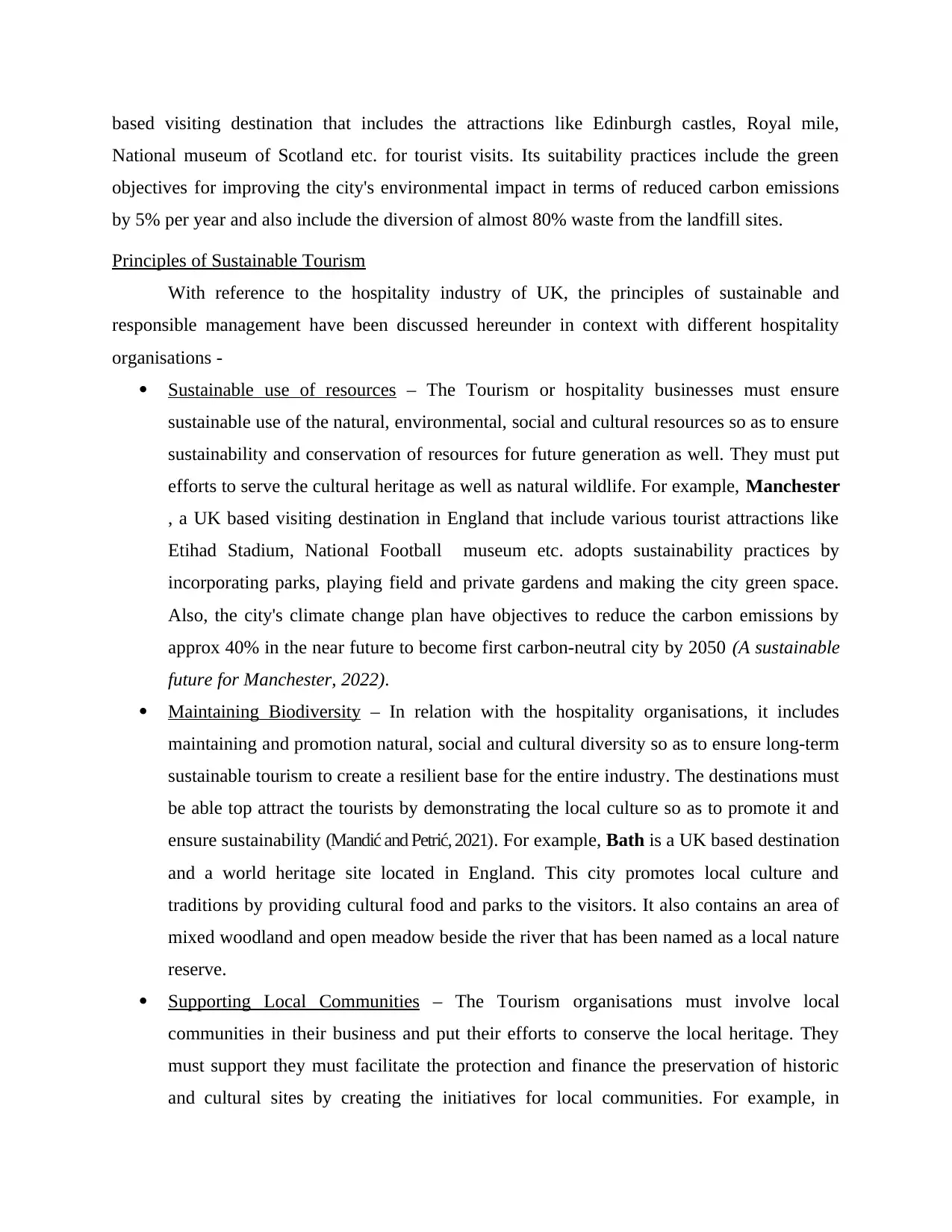
based visiting destination that includes the attractions like Edinburgh castles, Royal mile,
National museum of Scotland etc. for tourist visits. Its suitability practices include the green
objectives for improving the city's environmental impact in terms of reduced carbon emissions
by 5% per year and also include the diversion of almost 80% waste from the landfill sites.
Principles of Sustainable Tourism
With reference to the hospitality industry of UK, the principles of sustainable and
responsible management have been discussed hereunder in context with different hospitality
organisations -
Sustainable use of resources – The Tourism or hospitality businesses must ensure
sustainable use of the natural, environmental, social and cultural resources so as to ensure
sustainability and conservation of resources for future generation as well. They must put
efforts to serve the cultural heritage as well as natural wildlife. For example, Manchester
, a UK based visiting destination in England that include various tourist attractions like
Etihad Stadium, National Football museum etc. adopts sustainability practices by
incorporating parks, playing field and private gardens and making the city green space.
Also, the city's climate change plan have objectives to reduce the carbon emissions by
approx 40% in the near future to become first carbon-neutral city by 2050 (A sustainable
future for Manchester, 2022).
Maintaining Biodiversity – In relation with the hospitality organisations, it includes
maintaining and promotion natural, social and cultural diversity so as to ensure long-term
sustainable tourism to create a resilient base for the entire industry. The destinations must
be able top attract the tourists by demonstrating the local culture so as to promote it and
ensure sustainability (Mandić and Petrić, 2021). For example, Bath is a UK based destination
and a world heritage site located in England. This city promotes local culture and
traditions by providing cultural food and parks to the visitors. It also contains an area of
mixed woodland and open meadow beside the river that has been named as a local nature
reserve.
Supporting Local Communities – The Tourism organisations must involve local
communities in their business and put their efforts to conserve the local heritage. They
must support they must facilitate the protection and finance the preservation of historic
and cultural sites by creating the initiatives for local communities. For example, in
National museum of Scotland etc. for tourist visits. Its suitability practices include the green
objectives for improving the city's environmental impact in terms of reduced carbon emissions
by 5% per year and also include the diversion of almost 80% waste from the landfill sites.
Principles of Sustainable Tourism
With reference to the hospitality industry of UK, the principles of sustainable and
responsible management have been discussed hereunder in context with different hospitality
organisations -
Sustainable use of resources – The Tourism or hospitality businesses must ensure
sustainable use of the natural, environmental, social and cultural resources so as to ensure
sustainability and conservation of resources for future generation as well. They must put
efforts to serve the cultural heritage as well as natural wildlife. For example, Manchester
, a UK based visiting destination in England that include various tourist attractions like
Etihad Stadium, National Football museum etc. adopts sustainability practices by
incorporating parks, playing field and private gardens and making the city green space.
Also, the city's climate change plan have objectives to reduce the carbon emissions by
approx 40% in the near future to become first carbon-neutral city by 2050 (A sustainable
future for Manchester, 2022).
Maintaining Biodiversity – In relation with the hospitality organisations, it includes
maintaining and promotion natural, social and cultural diversity so as to ensure long-term
sustainable tourism to create a resilient base for the entire industry. The destinations must
be able top attract the tourists by demonstrating the local culture so as to promote it and
ensure sustainability (Mandić and Petrić, 2021). For example, Bath is a UK based destination
and a world heritage site located in England. This city promotes local culture and
traditions by providing cultural food and parks to the visitors. It also contains an area of
mixed woodland and open meadow beside the river that has been named as a local nature
reserve.
Supporting Local Communities – The Tourism organisations must involve local
communities in their business and put their efforts to conserve the local heritage. They
must support they must facilitate the protection and finance the preservation of historic
and cultural sites by creating the initiatives for local communities. For example, in
Secure Best Marks with AI Grader
Need help grading? Try our AI Grader for instant feedback on your assignments.
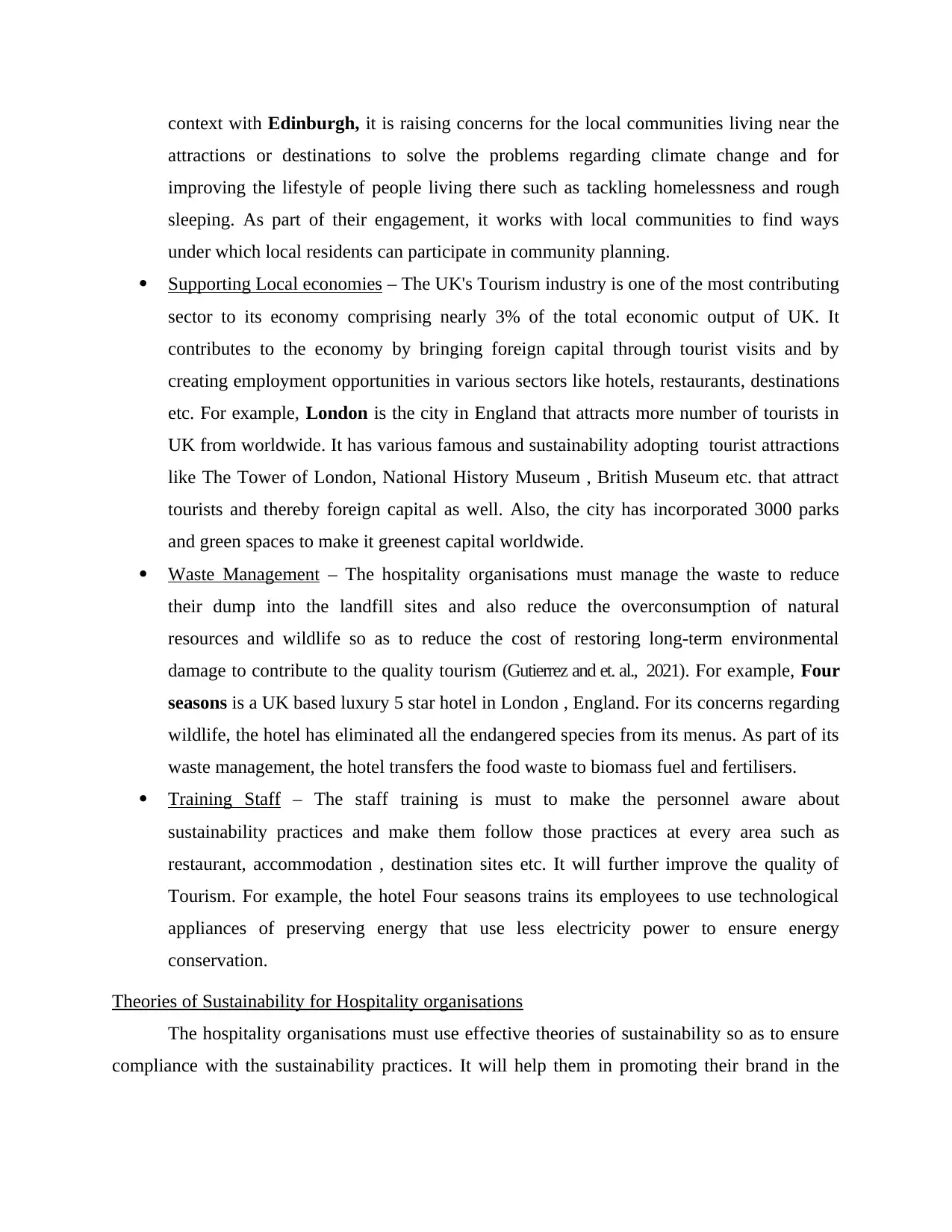
context with Edinburgh, it is raising concerns for the local communities living near the
attractions or destinations to solve the problems regarding climate change and for
improving the lifestyle of people living there such as tackling homelessness and rough
sleeping. As part of their engagement, it works with local communities to find ways
under which local residents can participate in community planning.
Supporting Local economies – The UK's Tourism industry is one of the most contributing
sector to its economy comprising nearly 3% of the total economic output of UK. It
contributes to the economy by bringing foreign capital through tourist visits and by
creating employment opportunities in various sectors like hotels, restaurants, destinations
etc. For example, London is the city in England that attracts more number of tourists in
UK from worldwide. It has various famous and sustainability adopting tourist attractions
like The Tower of London, National History Museum , British Museum etc. that attract
tourists and thereby foreign capital as well. Also, the city has incorporated 3000 parks
and green spaces to make it greenest capital worldwide.
Waste Management – The hospitality organisations must manage the waste to reduce
their dump into the landfill sites and also reduce the overconsumption of natural
resources and wildlife so as to reduce the cost of restoring long-term environmental
damage to contribute to the quality tourism (Gutierrez and et. al., 2021). For example, Four
seasons is a UK based luxury 5 star hotel in London , England. For its concerns regarding
wildlife, the hotel has eliminated all the endangered species from its menus. As part of its
waste management, the hotel transfers the food waste to biomass fuel and fertilisers.
Training Staff – The staff training is must to make the personnel aware about
sustainability practices and make them follow those practices at every area such as
restaurant, accommodation , destination sites etc. It will further improve the quality of
Tourism. For example, the hotel Four seasons trains its employees to use technological
appliances of preserving energy that use less electricity power to ensure energy
conservation.
Theories of Sustainability for Hospitality organisations
The hospitality organisations must use effective theories of sustainability so as to ensure
compliance with the sustainability practices. It will help them in promoting their brand in the
attractions or destinations to solve the problems regarding climate change and for
improving the lifestyle of people living there such as tackling homelessness and rough
sleeping. As part of their engagement, it works with local communities to find ways
under which local residents can participate in community planning.
Supporting Local economies – The UK's Tourism industry is one of the most contributing
sector to its economy comprising nearly 3% of the total economic output of UK. It
contributes to the economy by bringing foreign capital through tourist visits and by
creating employment opportunities in various sectors like hotels, restaurants, destinations
etc. For example, London is the city in England that attracts more number of tourists in
UK from worldwide. It has various famous and sustainability adopting tourist attractions
like The Tower of London, National History Museum , British Museum etc. that attract
tourists and thereby foreign capital as well. Also, the city has incorporated 3000 parks
and green spaces to make it greenest capital worldwide.
Waste Management – The hospitality organisations must manage the waste to reduce
their dump into the landfill sites and also reduce the overconsumption of natural
resources and wildlife so as to reduce the cost of restoring long-term environmental
damage to contribute to the quality tourism (Gutierrez and et. al., 2021). For example, Four
seasons is a UK based luxury 5 star hotel in London , England. For its concerns regarding
wildlife, the hotel has eliminated all the endangered species from its menus. As part of its
waste management, the hotel transfers the food waste to biomass fuel and fertilisers.
Training Staff – The staff training is must to make the personnel aware about
sustainability practices and make them follow those practices at every area such as
restaurant, accommodation , destination sites etc. It will further improve the quality of
Tourism. For example, the hotel Four seasons trains its employees to use technological
appliances of preserving energy that use less electricity power to ensure energy
conservation.
Theories of Sustainability for Hospitality organisations
The hospitality organisations must use effective theories of sustainability so as to ensure
compliance with the sustainability practices. It will help them in promoting their brand in the
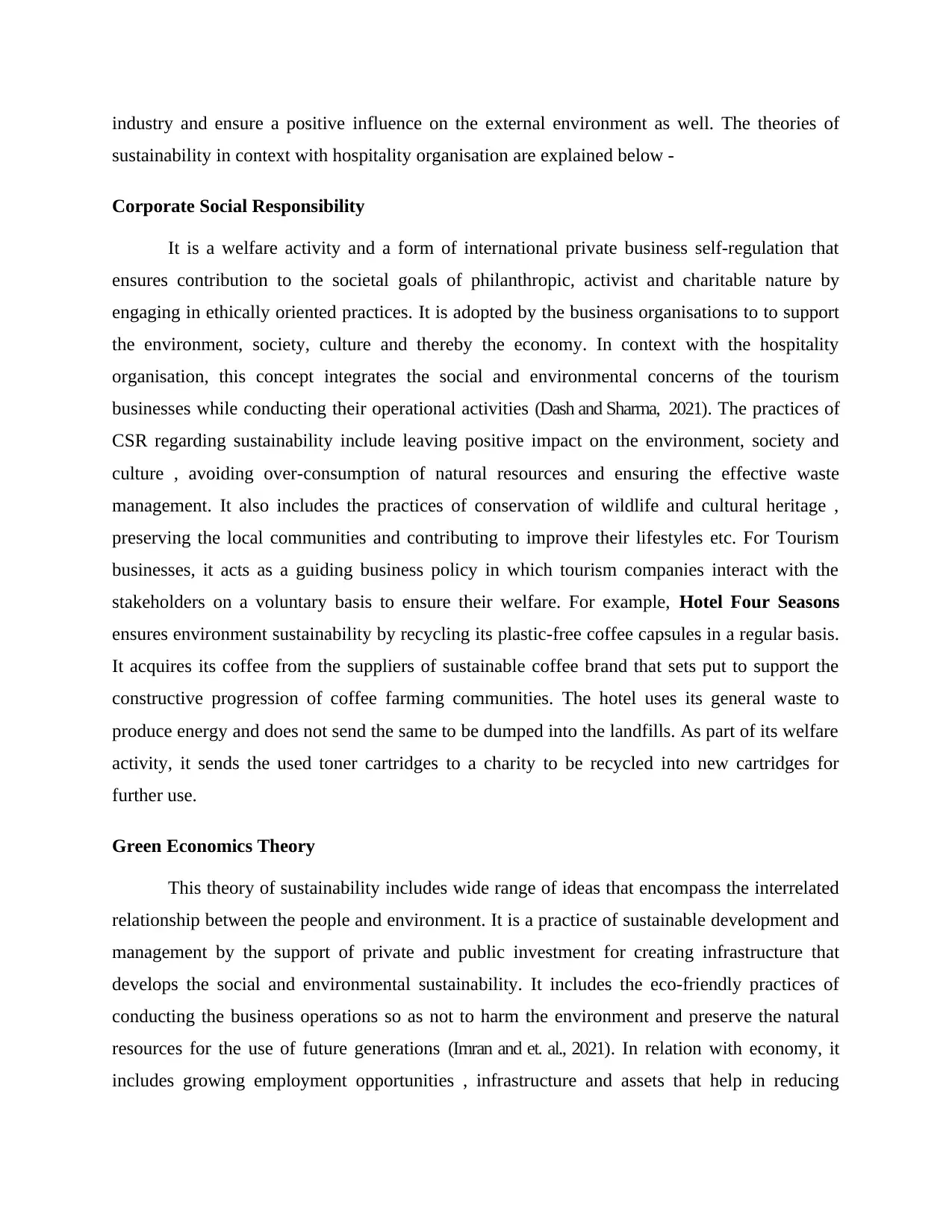
industry and ensure a positive influence on the external environment as well. The theories of
sustainability in context with hospitality organisation are explained below -
Corporate Social Responsibility
It is a welfare activity and a form of international private business self-regulation that
ensures contribution to the societal goals of philanthropic, activist and charitable nature by
engaging in ethically oriented practices. It is adopted by the business organisations to to support
the environment, society, culture and thereby the economy. In context with the hospitality
organisation, this concept integrates the social and environmental concerns of the tourism
businesses while conducting their operational activities (Dash and Sharma, 2021). The practices of
CSR regarding sustainability include leaving positive impact on the environment, society and
culture , avoiding over-consumption of natural resources and ensuring the effective waste
management. It also includes the practices of conservation of wildlife and cultural heritage ,
preserving the local communities and contributing to improve their lifestyles etc. For Tourism
businesses, it acts as a guiding business policy in which tourism companies interact with the
stakeholders on a voluntary basis to ensure their welfare. For example, Hotel Four Seasons
ensures environment sustainability by recycling its plastic-free coffee capsules in a regular basis.
It acquires its coffee from the suppliers of sustainable coffee brand that sets put to support the
constructive progression of coffee farming communities. The hotel uses its general waste to
produce energy and does not send the same to be dumped into the landfills. As part of its welfare
activity, it sends the used toner cartridges to a charity to be recycled into new cartridges for
further use.
Green Economics Theory
This theory of sustainability includes wide range of ideas that encompass the interrelated
relationship between the people and environment. It is a practice of sustainable development and
management by the support of private and public investment for creating infrastructure that
develops the social and environmental sustainability. It includes the eco-friendly practices of
conducting the business operations so as not to harm the environment and preserve the natural
resources for the use of future generations (Imran and et. al., 2021). In relation with economy, it
includes growing employment opportunities , infrastructure and assets that help in reducing
sustainability in context with hospitality organisation are explained below -
Corporate Social Responsibility
It is a welfare activity and a form of international private business self-regulation that
ensures contribution to the societal goals of philanthropic, activist and charitable nature by
engaging in ethically oriented practices. It is adopted by the business organisations to to support
the environment, society, culture and thereby the economy. In context with the hospitality
organisation, this concept integrates the social and environmental concerns of the tourism
businesses while conducting their operational activities (Dash and Sharma, 2021). The practices of
CSR regarding sustainability include leaving positive impact on the environment, society and
culture , avoiding over-consumption of natural resources and ensuring the effective waste
management. It also includes the practices of conservation of wildlife and cultural heritage ,
preserving the local communities and contributing to improve their lifestyles etc. For Tourism
businesses, it acts as a guiding business policy in which tourism companies interact with the
stakeholders on a voluntary basis to ensure their welfare. For example, Hotel Four Seasons
ensures environment sustainability by recycling its plastic-free coffee capsules in a regular basis.
It acquires its coffee from the suppliers of sustainable coffee brand that sets put to support the
constructive progression of coffee farming communities. The hotel uses its general waste to
produce energy and does not send the same to be dumped into the landfills. As part of its welfare
activity, it sends the used toner cartridges to a charity to be recycled into new cartridges for
further use.
Green Economics Theory
This theory of sustainability includes wide range of ideas that encompass the interrelated
relationship between the people and environment. It is a practice of sustainable development and
management by the support of private and public investment for creating infrastructure that
develops the social and environmental sustainability. It includes the eco-friendly practices of
conducting the business operations so as not to harm the environment and preserve the natural
resources for the use of future generations (Imran and et. al., 2021). In relation with economy, it
includes growing employment opportunities , infrastructure and assets that help in reducing
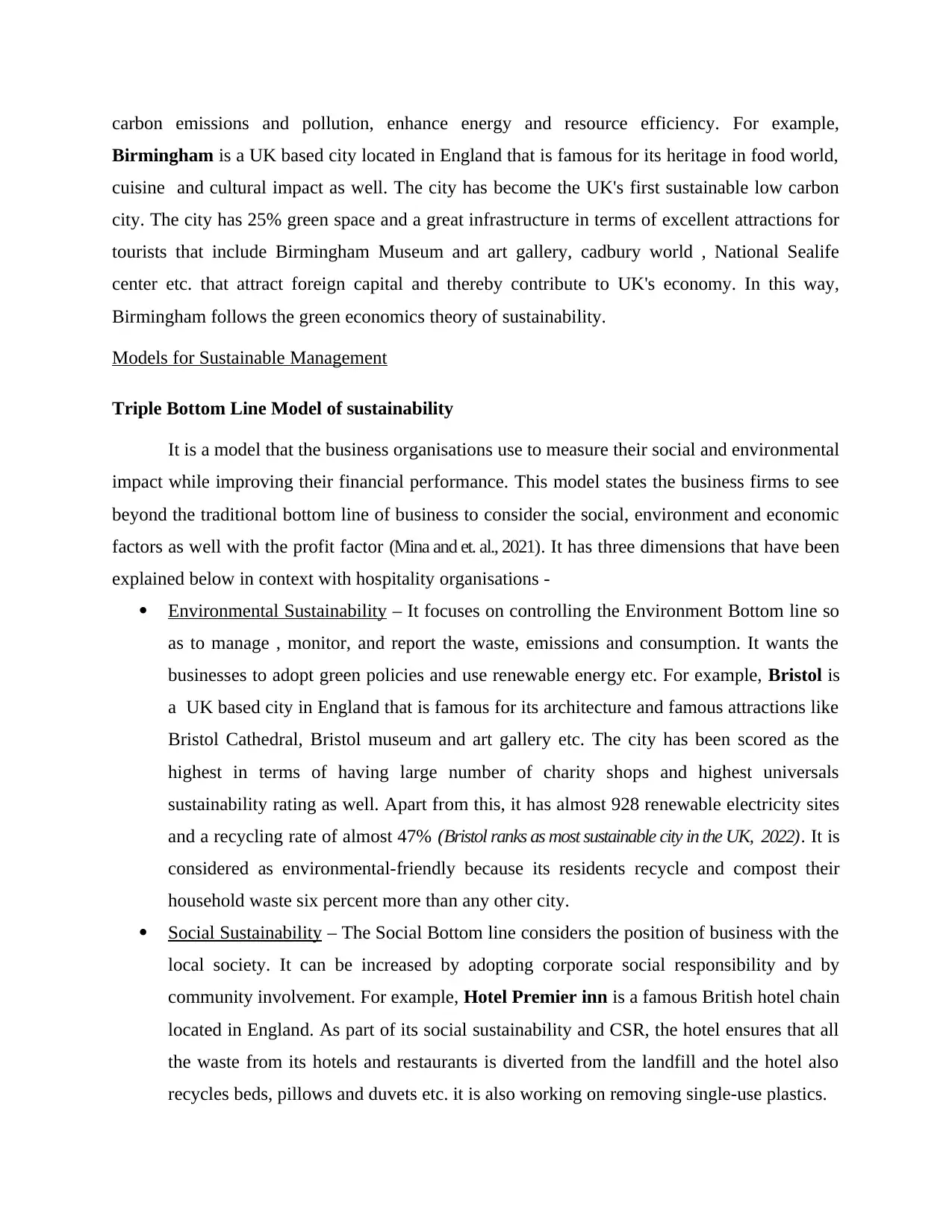
carbon emissions and pollution, enhance energy and resource efficiency. For example,
Birmingham is a UK based city located in England that is famous for its heritage in food world,
cuisine and cultural impact as well. The city has become the UK's first sustainable low carbon
city. The city has 25% green space and a great infrastructure in terms of excellent attractions for
tourists that include Birmingham Museum and art gallery, cadbury world , National Sealife
center etc. that attract foreign capital and thereby contribute to UK's economy. In this way,
Birmingham follows the green economics theory of sustainability.
Models for Sustainable Management
Triple Bottom Line Model of sustainability
It is a model that the business organisations use to measure their social and environmental
impact while improving their financial performance. This model states the business firms to see
beyond the traditional bottom line of business to consider the social, environment and economic
factors as well with the profit factor (Mina and et. al., 2021). It has three dimensions that have been
explained below in context with hospitality organisations -
Environmental Sustainability – It focuses on controlling the Environment Bottom line so
as to manage , monitor, and report the waste, emissions and consumption. It wants the
businesses to adopt green policies and use renewable energy etc. For example, Bristol is
a UK based city in England that is famous for its architecture and famous attractions like
Bristol Cathedral, Bristol museum and art gallery etc. The city has been scored as the
highest in terms of having large number of charity shops and highest universals
sustainability rating as well. Apart from this, it has almost 928 renewable electricity sites
and a recycling rate of almost 47% (Bristol ranks as most sustainable city in the UK, 2022). It is
considered as environmental-friendly because its residents recycle and compost their
household waste six percent more than any other city.
Social Sustainability – The Social Bottom line considers the position of business with the
local society. It can be increased by adopting corporate social responsibility and by
community involvement. For example, Hotel Premier inn is a famous British hotel chain
located in England. As part of its social sustainability and CSR, the hotel ensures that all
the waste from its hotels and restaurants is diverted from the landfill and the hotel also
recycles beds, pillows and duvets etc. it is also working on removing single-use plastics.
Birmingham is a UK based city located in England that is famous for its heritage in food world,
cuisine and cultural impact as well. The city has become the UK's first sustainable low carbon
city. The city has 25% green space and a great infrastructure in terms of excellent attractions for
tourists that include Birmingham Museum and art gallery, cadbury world , National Sealife
center etc. that attract foreign capital and thereby contribute to UK's economy. In this way,
Birmingham follows the green economics theory of sustainability.
Models for Sustainable Management
Triple Bottom Line Model of sustainability
It is a model that the business organisations use to measure their social and environmental
impact while improving their financial performance. This model states the business firms to see
beyond the traditional bottom line of business to consider the social, environment and economic
factors as well with the profit factor (Mina and et. al., 2021). It has three dimensions that have been
explained below in context with hospitality organisations -
Environmental Sustainability – It focuses on controlling the Environment Bottom line so
as to manage , monitor, and report the waste, emissions and consumption. It wants the
businesses to adopt green policies and use renewable energy etc. For example, Bristol is
a UK based city in England that is famous for its architecture and famous attractions like
Bristol Cathedral, Bristol museum and art gallery etc. The city has been scored as the
highest in terms of having large number of charity shops and highest universals
sustainability rating as well. Apart from this, it has almost 928 renewable electricity sites
and a recycling rate of almost 47% (Bristol ranks as most sustainable city in the UK, 2022). It is
considered as environmental-friendly because its residents recycle and compost their
household waste six percent more than any other city.
Social Sustainability – The Social Bottom line considers the position of business with the
local society. It can be increased by adopting corporate social responsibility and by
community involvement. For example, Hotel Premier inn is a famous British hotel chain
located in England. As part of its social sustainability and CSR, the hotel ensures that all
the waste from its hotels and restaurants is diverted from the landfill and the hotel also
recycles beds, pillows and duvets etc. it is also working on removing single-use plastics.
Paraphrase This Document
Need a fresh take? Get an instant paraphrase of this document with our AI Paraphraser
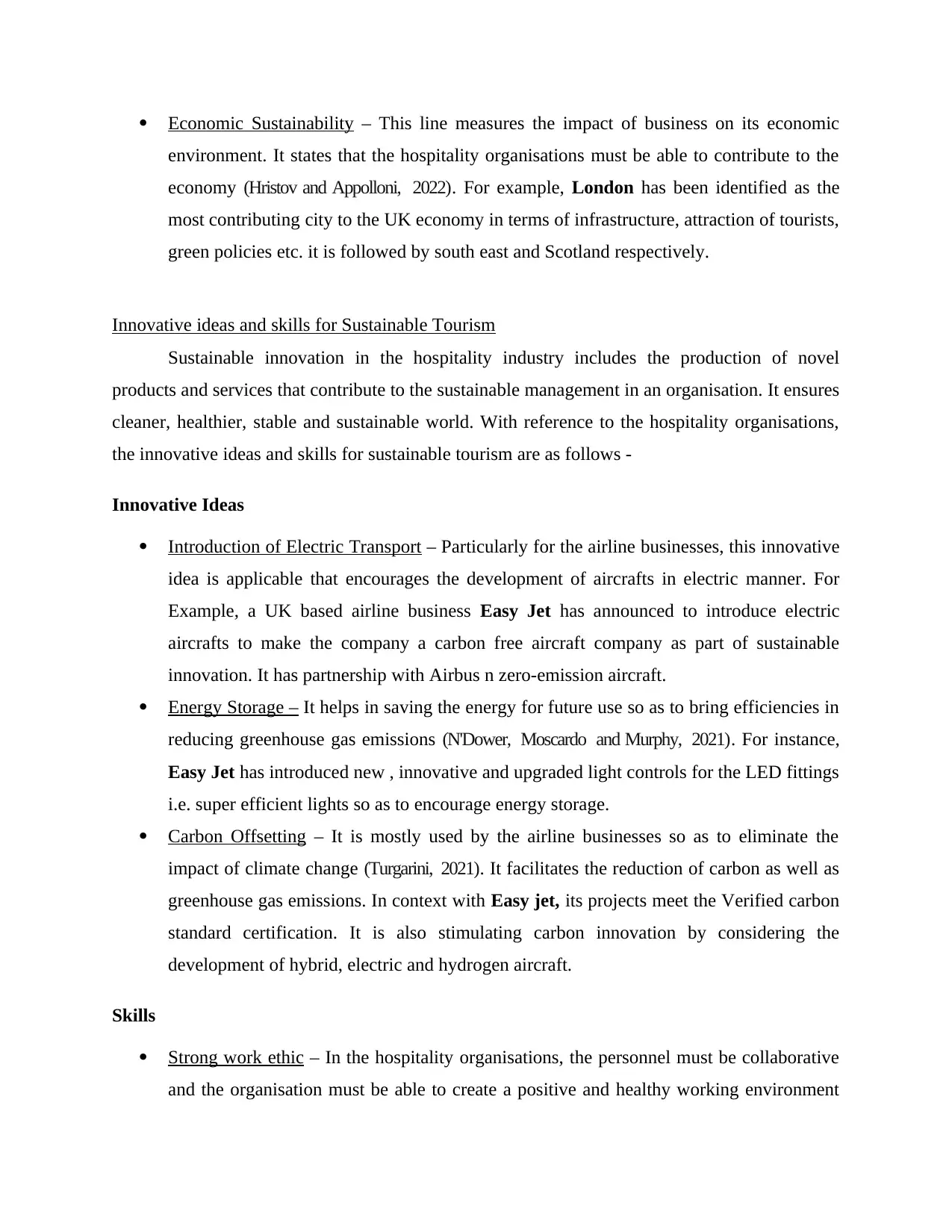
Economic Sustainability – This line measures the impact of business on its economic
environment. It states that the hospitality organisations must be able to contribute to the
economy (Hristov and Appolloni, 2022). For example, London has been identified as the
most contributing city to the UK economy in terms of infrastructure, attraction of tourists,
green policies etc. it is followed by south east and Scotland respectively.
Innovative ideas and skills for Sustainable Tourism
Sustainable innovation in the hospitality industry includes the production of novel
products and services that contribute to the sustainable management in an organisation. It ensures
cleaner, healthier, stable and sustainable world. With reference to the hospitality organisations,
the innovative ideas and skills for sustainable tourism are as follows -
Innovative Ideas
Introduction of Electric Transport – Particularly for the airline businesses, this innovative
idea is applicable that encourages the development of aircrafts in electric manner. For
Example, a UK based airline business Easy Jet has announced to introduce electric
aircrafts to make the company a carbon free aircraft company as part of sustainable
innovation. It has partnership with Airbus n zero-emission aircraft.
Energy Storage – It helps in saving the energy for future use so as to bring efficiencies in
reducing greenhouse gas emissions (N'Dower, Moscardo and Murphy, 2021). For instance,
Easy Jet has introduced new , innovative and upgraded light controls for the LED fittings
i.e. super efficient lights so as to encourage energy storage.
Carbon Offsetting – It is mostly used by the airline businesses so as to eliminate the
impact of climate change (Turgarini, 2021). It facilitates the reduction of carbon as well as
greenhouse gas emissions. In context with Easy jet, its projects meet the Verified carbon
standard certification. It is also stimulating carbon innovation by considering the
development of hybrid, electric and hydrogen aircraft.
Skills
Strong work ethic – In the hospitality organisations, the personnel must be collaborative
and the organisation must be able to create a positive and healthy working environment
environment. It states that the hospitality organisations must be able to contribute to the
economy (Hristov and Appolloni, 2022). For example, London has been identified as the
most contributing city to the UK economy in terms of infrastructure, attraction of tourists,
green policies etc. it is followed by south east and Scotland respectively.
Innovative ideas and skills for Sustainable Tourism
Sustainable innovation in the hospitality industry includes the production of novel
products and services that contribute to the sustainable management in an organisation. It ensures
cleaner, healthier, stable and sustainable world. With reference to the hospitality organisations,
the innovative ideas and skills for sustainable tourism are as follows -
Innovative Ideas
Introduction of Electric Transport – Particularly for the airline businesses, this innovative
idea is applicable that encourages the development of aircrafts in electric manner. For
Example, a UK based airline business Easy Jet has announced to introduce electric
aircrafts to make the company a carbon free aircraft company as part of sustainable
innovation. It has partnership with Airbus n zero-emission aircraft.
Energy Storage – It helps in saving the energy for future use so as to bring efficiencies in
reducing greenhouse gas emissions (N'Dower, Moscardo and Murphy, 2021). For instance,
Easy Jet has introduced new , innovative and upgraded light controls for the LED fittings
i.e. super efficient lights so as to encourage energy storage.
Carbon Offsetting – It is mostly used by the airline businesses so as to eliminate the
impact of climate change (Turgarini, 2021). It facilitates the reduction of carbon as well as
greenhouse gas emissions. In context with Easy jet, its projects meet the Verified carbon
standard certification. It is also stimulating carbon innovation by considering the
development of hybrid, electric and hydrogen aircraft.
Skills
Strong work ethic – In the hospitality organisations, the personnel must be collaborative
and the organisation must be able to create a positive and healthy working environment
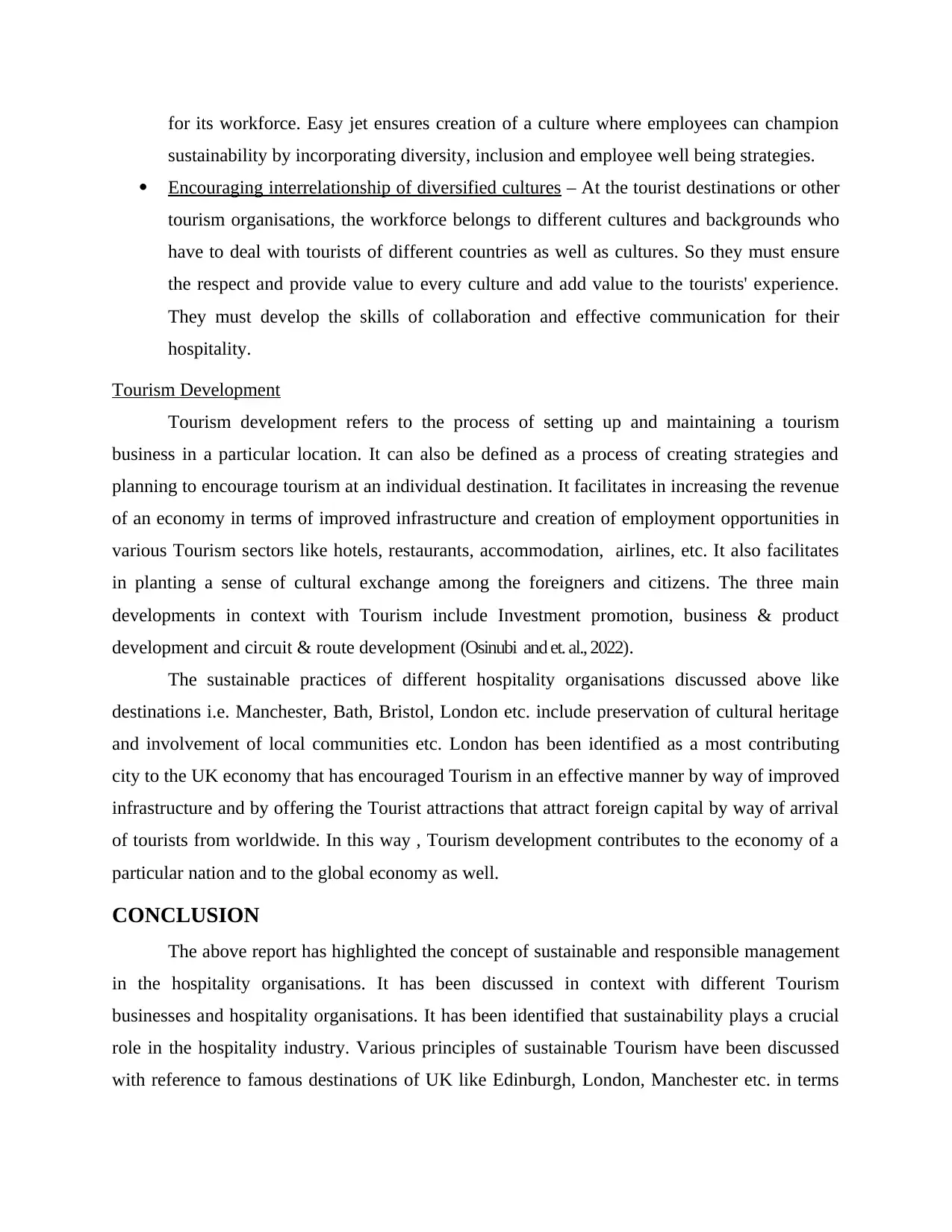
for its workforce. Easy jet ensures creation of a culture where employees can champion
sustainability by incorporating diversity, inclusion and employee well being strategies.
Encouraging interrelationship of diversified cultures – At the tourist destinations or other
tourism organisations, the workforce belongs to different cultures and backgrounds who
have to deal with tourists of different countries as well as cultures. So they must ensure
the respect and provide value to every culture and add value to the tourists' experience.
They must develop the skills of collaboration and effective communication for their
hospitality.
Tourism Development
Tourism development refers to the process of setting up and maintaining a tourism
business in a particular location. It can also be defined as a process of creating strategies and
planning to encourage tourism at an individual destination. It facilitates in increasing the revenue
of an economy in terms of improved infrastructure and creation of employment opportunities in
various Tourism sectors like hotels, restaurants, accommodation, airlines, etc. It also facilitates
in planting a sense of cultural exchange among the foreigners and citizens. The three main
developments in context with Tourism include Investment promotion, business & product
development and circuit & route development (Osinubi and et. al., 2022).
The sustainable practices of different hospitality organisations discussed above like
destinations i.e. Manchester, Bath, Bristol, London etc. include preservation of cultural heritage
and involvement of local communities etc. London has been identified as a most contributing
city to the UK economy that has encouraged Tourism in an effective manner by way of improved
infrastructure and by offering the Tourist attractions that attract foreign capital by way of arrival
of tourists from worldwide. In this way , Tourism development contributes to the economy of a
particular nation and to the global economy as well.
CONCLUSION
The above report has highlighted the concept of sustainable and responsible management
in the hospitality organisations. It has been discussed in context with different Tourism
businesses and hospitality organisations. It has been identified that sustainability plays a crucial
role in the hospitality industry. Various principles of sustainable Tourism have been discussed
with reference to famous destinations of UK like Edinburgh, London, Manchester etc. in terms
sustainability by incorporating diversity, inclusion and employee well being strategies.
Encouraging interrelationship of diversified cultures – At the tourist destinations or other
tourism organisations, the workforce belongs to different cultures and backgrounds who
have to deal with tourists of different countries as well as cultures. So they must ensure
the respect and provide value to every culture and add value to the tourists' experience.
They must develop the skills of collaboration and effective communication for their
hospitality.
Tourism Development
Tourism development refers to the process of setting up and maintaining a tourism
business in a particular location. It can also be defined as a process of creating strategies and
planning to encourage tourism at an individual destination. It facilitates in increasing the revenue
of an economy in terms of improved infrastructure and creation of employment opportunities in
various Tourism sectors like hotels, restaurants, accommodation, airlines, etc. It also facilitates
in planting a sense of cultural exchange among the foreigners and citizens. The three main
developments in context with Tourism include Investment promotion, business & product
development and circuit & route development (Osinubi and et. al., 2022).
The sustainable practices of different hospitality organisations discussed above like
destinations i.e. Manchester, Bath, Bristol, London etc. include preservation of cultural heritage
and involvement of local communities etc. London has been identified as a most contributing
city to the UK economy that has encouraged Tourism in an effective manner by way of improved
infrastructure and by offering the Tourist attractions that attract foreign capital by way of arrival
of tourists from worldwide. In this way , Tourism development contributes to the economy of a
particular nation and to the global economy as well.
CONCLUSION
The above report has highlighted the concept of sustainable and responsible management
in the hospitality organisations. It has been discussed in context with different Tourism
businesses and hospitality organisations. It has been identified that sustainability plays a crucial
role in the hospitality industry. Various principles of sustainable Tourism have been discussed
with reference to famous destinations of UK like Edinburgh, London, Manchester etc. in terms
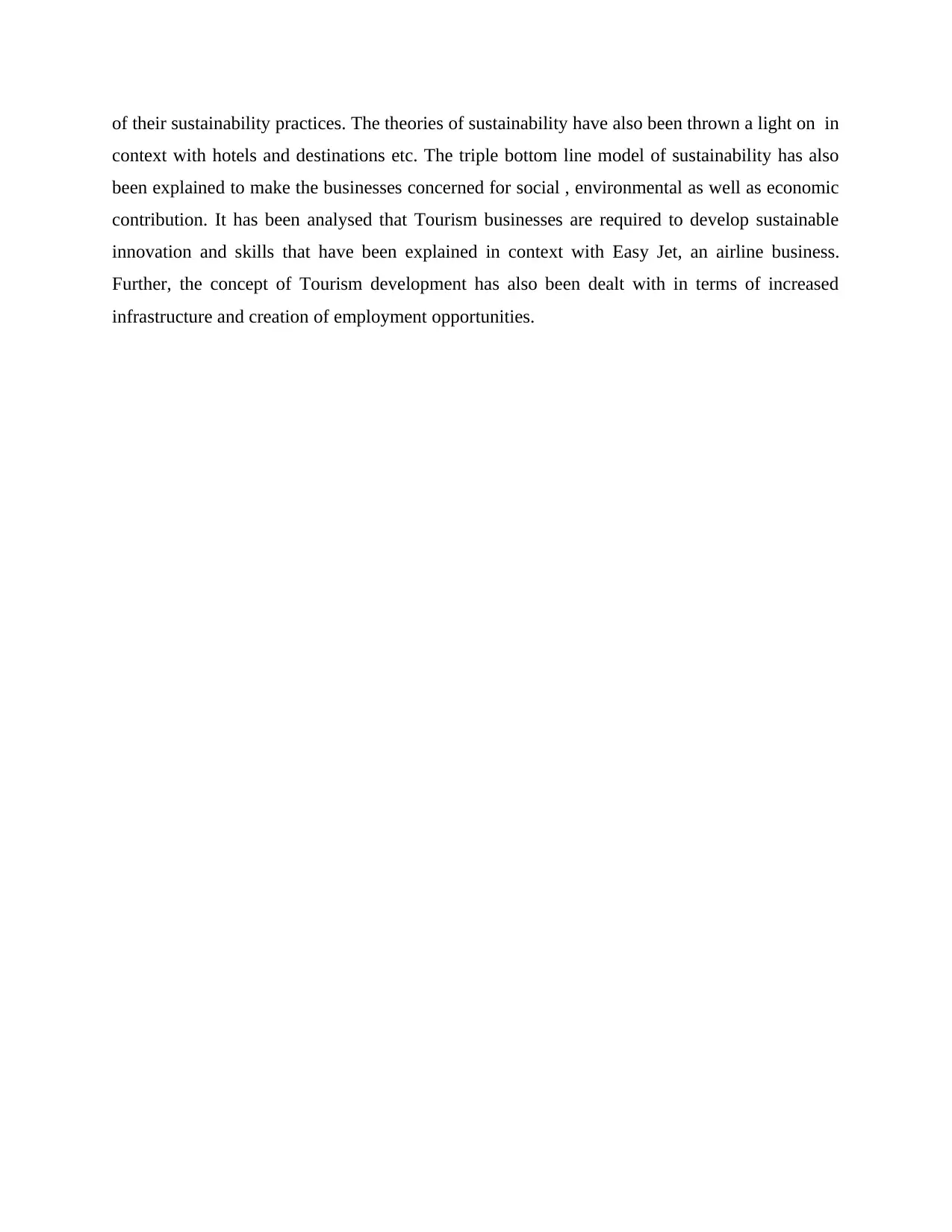
of their sustainability practices. The theories of sustainability have also been thrown a light on in
context with hotels and destinations etc. The triple bottom line model of sustainability has also
been explained to make the businesses concerned for social , environmental as well as economic
contribution. It has been analysed that Tourism businesses are required to develop sustainable
innovation and skills that have been explained in context with Easy Jet, an airline business.
Further, the concept of Tourism development has also been dealt with in terms of increased
infrastructure and creation of employment opportunities.
context with hotels and destinations etc. The triple bottom line model of sustainability has also
been explained to make the businesses concerned for social , environmental as well as economic
contribution. It has been analysed that Tourism businesses are required to develop sustainable
innovation and skills that have been explained in context with Easy Jet, an airline business.
Further, the concept of Tourism development has also been dealt with in terms of increased
infrastructure and creation of employment opportunities.
Secure Best Marks with AI Grader
Need help grading? Try our AI Grader for instant feedback on your assignments.
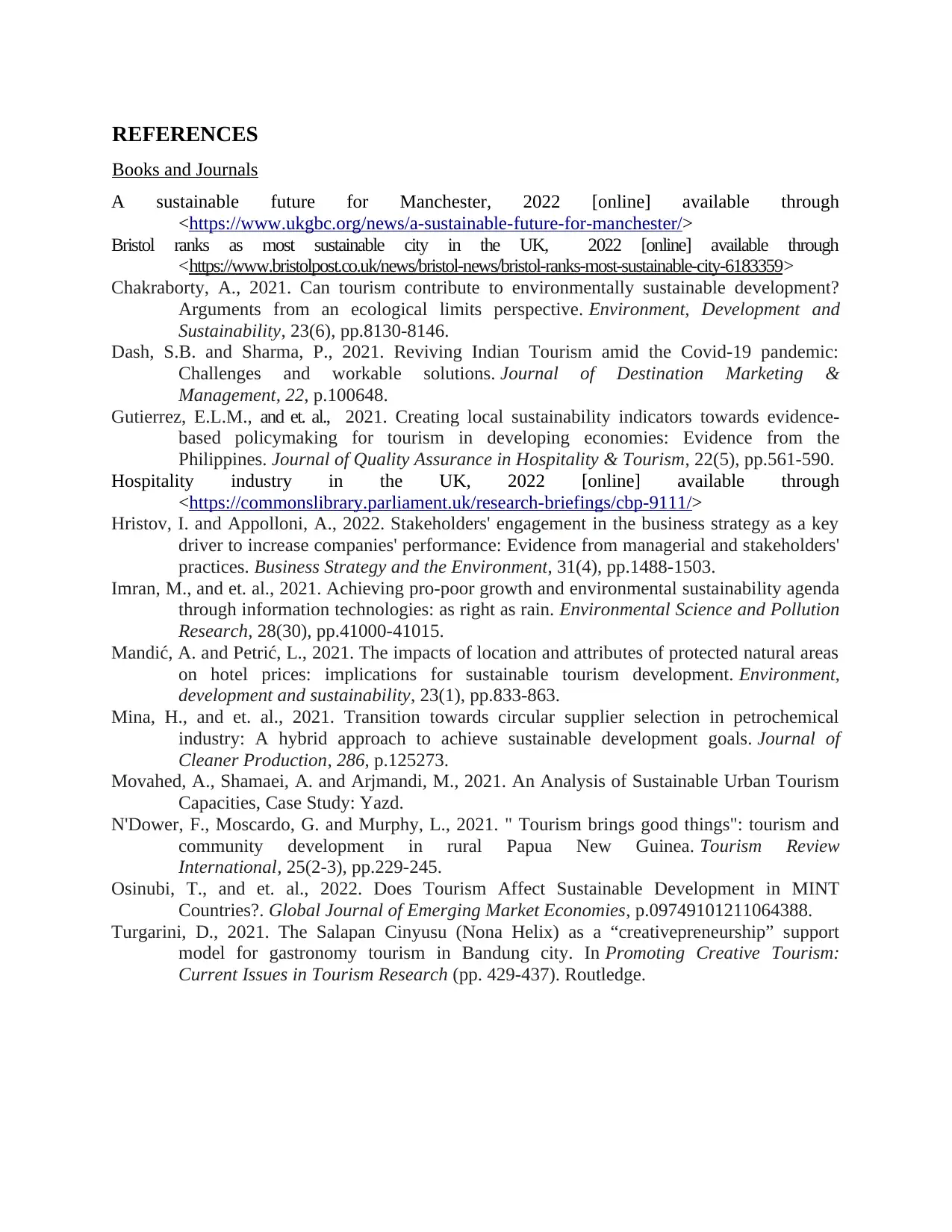
REFERENCES
Books and Journals
A sustainable future for Manchester, 2022 [online] available through
<https://www.ukgbc.org/news/a-sustainable-future-for-manchester/>
Bristol ranks as most sustainable city in the UK, 2022 [online] available through
<https://www.bristolpost.co.uk/news/bristol-news/bristol-ranks-most-sustainable-city-6183359>
Chakraborty, A., 2021. Can tourism contribute to environmentally sustainable development?
Arguments from an ecological limits perspective. Environment, Development and
Sustainability, 23(6), pp.8130-8146.
Dash, S.B. and Sharma, P., 2021. Reviving Indian Tourism amid the Covid-19 pandemic:
Challenges and workable solutions. Journal of Destination Marketing &
Management, 22, p.100648.
Gutierrez, E.L.M., and et. al., 2021. Creating local sustainability indicators towards evidence-
based policymaking for tourism in developing economies: Evidence from the
Philippines. Journal of Quality Assurance in Hospitality & Tourism, 22(5), pp.561-590.
Hospitality industry in the UK, 2022 [online] available through
<https://commonslibrary.parliament.uk/research-briefings/cbp-9111/>
Hristov, I. and Appolloni, A., 2022. Stakeholders' engagement in the business strategy as a key
driver to increase companies' performance: Evidence from managerial and stakeholders'
practices. Business Strategy and the Environment, 31(4), pp.1488-1503.
Imran, M., and et. al., 2021. Achieving pro-poor growth and environmental sustainability agenda
through information technologies: as right as rain. Environmental Science and Pollution
Research, 28(30), pp.41000-41015.
Mandić, A. and Petrić, L., 2021. The impacts of location and attributes of protected natural areas
on hotel prices: implications for sustainable tourism development. Environment,
development and sustainability, 23(1), pp.833-863.
Mina, H., and et. al., 2021. Transition towards circular supplier selection in petrochemical
industry: A hybrid approach to achieve sustainable development goals. Journal of
Cleaner Production, 286, p.125273.
Movahed, A., Shamaei, A. and Arjmandi, M., 2021. An Analysis of Sustainable Urban Tourism
Capacities, Case Study: Yazd.
N'Dower, F., Moscardo, G. and Murphy, L., 2021. " Tourism brings good things": tourism and
community development in rural Papua New Guinea. Tourism Review
International, 25(2-3), pp.229-245.
Osinubi, T., and et. al., 2022. Does Tourism Affect Sustainable Development in MINT
Countries?. Global Journal of Emerging Market Economies, p.09749101211064388.
Turgarini, D., 2021. The Salapan Cinyusu (Nona Helix) as a “creativepreneurship” support
model for gastronomy tourism in Bandung city. In Promoting Creative Tourism:
Current Issues in Tourism Research (pp. 429-437). Routledge.
Books and Journals
A sustainable future for Manchester, 2022 [online] available through
<https://www.ukgbc.org/news/a-sustainable-future-for-manchester/>
Bristol ranks as most sustainable city in the UK, 2022 [online] available through
<https://www.bristolpost.co.uk/news/bristol-news/bristol-ranks-most-sustainable-city-6183359>
Chakraborty, A., 2021. Can tourism contribute to environmentally sustainable development?
Arguments from an ecological limits perspective. Environment, Development and
Sustainability, 23(6), pp.8130-8146.
Dash, S.B. and Sharma, P., 2021. Reviving Indian Tourism amid the Covid-19 pandemic:
Challenges and workable solutions. Journal of Destination Marketing &
Management, 22, p.100648.
Gutierrez, E.L.M., and et. al., 2021. Creating local sustainability indicators towards evidence-
based policymaking for tourism in developing economies: Evidence from the
Philippines. Journal of Quality Assurance in Hospitality & Tourism, 22(5), pp.561-590.
Hospitality industry in the UK, 2022 [online] available through
<https://commonslibrary.parliament.uk/research-briefings/cbp-9111/>
Hristov, I. and Appolloni, A., 2022. Stakeholders' engagement in the business strategy as a key
driver to increase companies' performance: Evidence from managerial and stakeholders'
practices. Business Strategy and the Environment, 31(4), pp.1488-1503.
Imran, M., and et. al., 2021. Achieving pro-poor growth and environmental sustainability agenda
through information technologies: as right as rain. Environmental Science and Pollution
Research, 28(30), pp.41000-41015.
Mandić, A. and Petrić, L., 2021. The impacts of location and attributes of protected natural areas
on hotel prices: implications for sustainable tourism development. Environment,
development and sustainability, 23(1), pp.833-863.
Mina, H., and et. al., 2021. Transition towards circular supplier selection in petrochemical
industry: A hybrid approach to achieve sustainable development goals. Journal of
Cleaner Production, 286, p.125273.
Movahed, A., Shamaei, A. and Arjmandi, M., 2021. An Analysis of Sustainable Urban Tourism
Capacities, Case Study: Yazd.
N'Dower, F., Moscardo, G. and Murphy, L., 2021. " Tourism brings good things": tourism and
community development in rural Papua New Guinea. Tourism Review
International, 25(2-3), pp.229-245.
Osinubi, T., and et. al., 2022. Does Tourism Affect Sustainable Development in MINT
Countries?. Global Journal of Emerging Market Economies, p.09749101211064388.
Turgarini, D., 2021. The Salapan Cinyusu (Nona Helix) as a “creativepreneurship” support
model for gastronomy tourism in Bandung city. In Promoting Creative Tourism:
Current Issues in Tourism Research (pp. 429-437). Routledge.
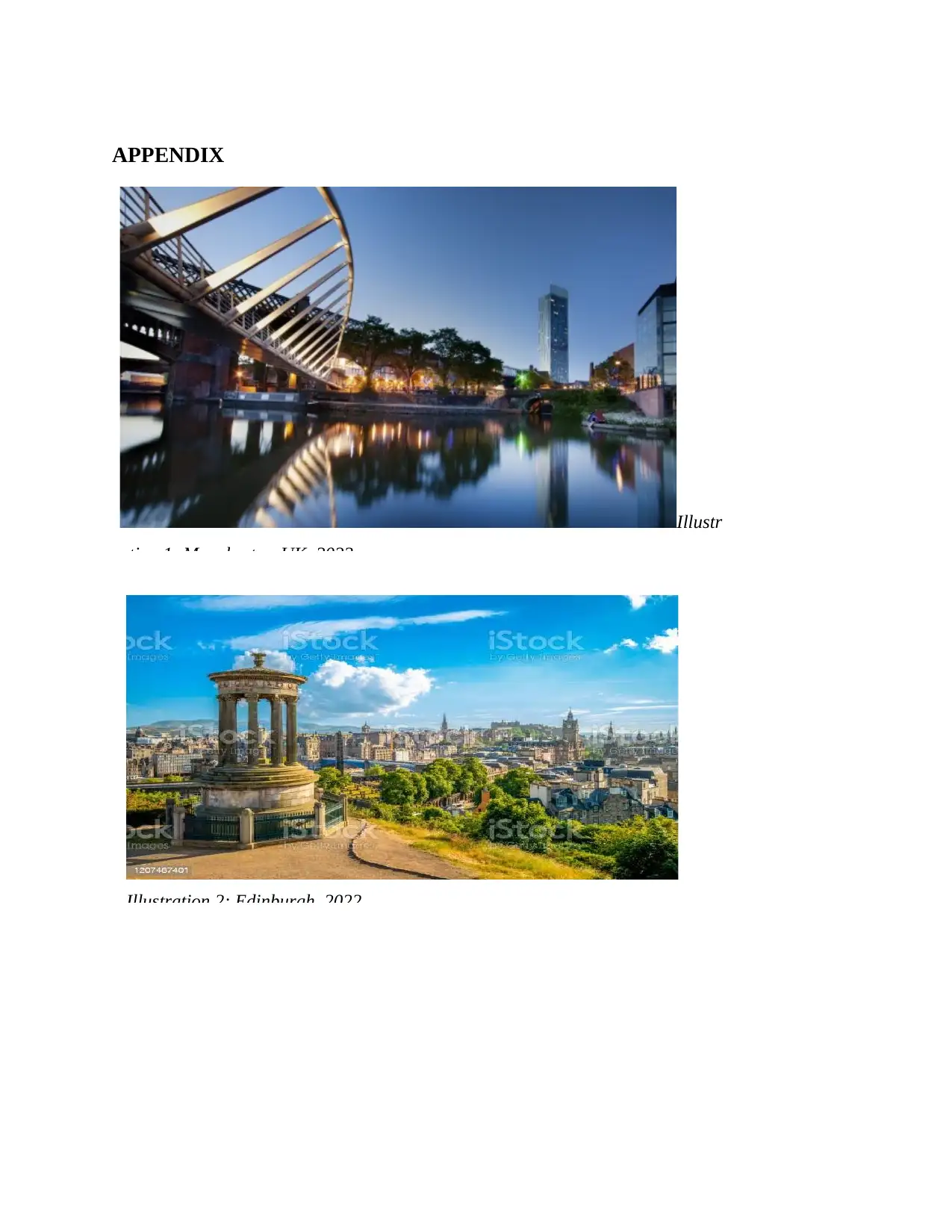
APPENDIX
Illustr
ation 1: Manchester, UK, 2022
Illustration 2: Edinburgh, 2022
Illustr
ation 1: Manchester, UK, 2022
Illustration 2: Edinburgh, 2022
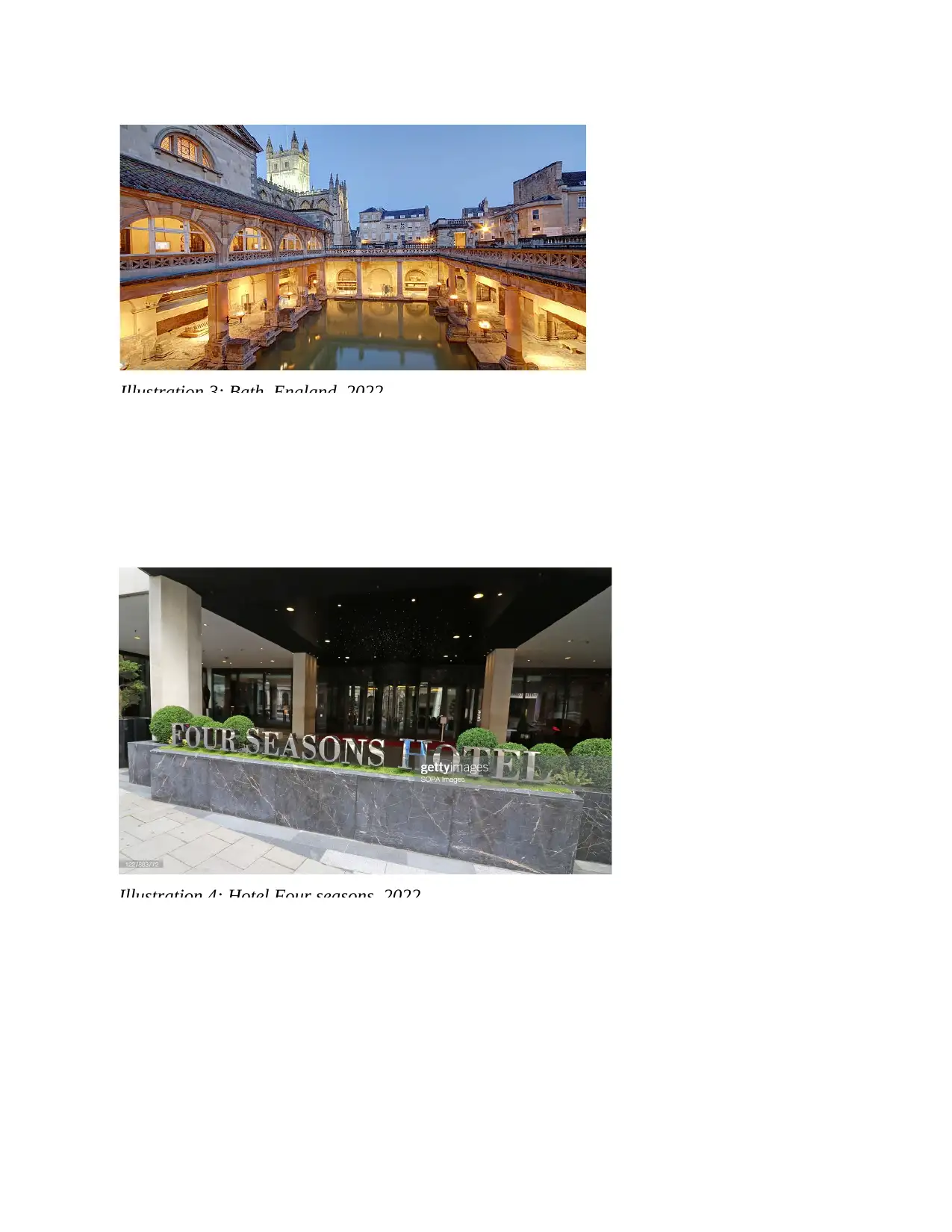
Illustration 3: Bath, England, 2022
Illustration 4: Hotel Four seasons, 2022
Illustration 4: Hotel Four seasons, 2022
Paraphrase This Document
Need a fresh take? Get an instant paraphrase of this document with our AI Paraphraser

Illustration 5: The city of Bestol, England, 2022
1 out of 14
Related Documents
Your All-in-One AI-Powered Toolkit for Academic Success.
+13062052269
info@desklib.com
Available 24*7 on WhatsApp / Email
![[object Object]](/_next/static/media/star-bottom.7253800d.svg)
Unlock your academic potential
© 2024 | Zucol Services PVT LTD | All rights reserved.

